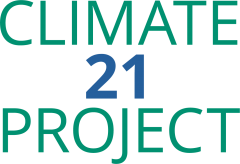 CLIMATE 21 PROJECT — Introduction from the Co-Chairs, Nov. 2020
CLIMATE 21 PROJECT — Introduction from the Co-Chairs, Nov. 2020
In January 2021, the President will begin his four-year term facing four simultaneous crises: tens of millions of Americans without a paycheck, racial injustice, the punishing toll of climate change, and the devastating impact of the COVID pandemic. It is essential to address all four immediately; none can be put aside.
The key to unlocking this puzzle is for the President to hit the ground running in 2021 with actionable steps to build the capacity of his administration to tackle the climate crisis quickly with the existing tools at hand. The transition period and first 100 days will be critical for laying the foundation for an effective administration-wide approach on climate change.
From using executive powers to working with Congress, states and nations around the world, the White House must act decisively to create an administration-wide infrastructure needed to achieve results.
The Climate 21 Project has assembled recommendations in anticipation of this critical moment to jumpstart ambitious U.S. leadership to confront the climate crisis. We have tapped the expertise of more than 150 experts with high-level government experience who volunteered their time to imagine what it would take for the White House and federal agencies to mobilize effectively as part of a whole-of-government climate response at the dawn of the next administration.
We are pleased to present the results in a series of papers covering the White House and essential federal agencies.
Importantly, the Climate 21 Project is not offerring a policy agenda. Rather, we are delivering actionable advice for a rapid-start, administration-wide response coordinated by the White House and accountable to the President in order to achieve his climate policy agenda.
To fully mobilize on climate change and the interlocking crises we face, Congress must also do its part and provide new authorities that allow for structural and systemic changes. Until those battles have been won, the new administration must organize to exercise the great power it already has to make progress.
In assembling this guidance document, certain themes emerged as critical for success across the board. Communities need to be engaged in developing solutions. High-level climate teams with the ear of the cabinet secretary will be needed in each department or agency. Career government employees should be respected and engaged early. And budgets should re ect the urgency of addressing the most critical problems facing the nation.
We are grateful for the time and contributions of the Climate 21 Project Steering Committee, the authors, and the experts they interviewed.
There is no time to waste, which is what the Climate 21 Project aims to address. Two years ago, the United States government’s top scientific agencies along with more than 300 experts released an extensively peer-reviewed national climate assessment. They issued a stark warning: “Future risks from climate change depend primarily on decisions made today.”
After witnessing the wildfires, floods, droughts and storms of 2020, the decisions being made today are more essential than ever. We hope these memos make it possible for the new administration to make them swiftly and well.
>>> Christy Goldfuss, CLIMATE 21 CoChair, Center for American Progress
>>> Tom Profeta, CLIMATE 21 CoChair, Nicholas Institute for Environmental Policy at Duke University
>>>>>>>>……………………>>>>>>>>
CLIMATE 21 — Transition Recommendations For Climate Governance and Action
The Climate 21 Project’s recommendations were produced by a Steering Committee of experienced government climate experts. The contents have been informed by interviews tapping the additional expertise of more than 150 experts with high-level government experience on climate and energy, including nine cabinet appointees.
Each Climate 21 Project memo identifes its lead authors, including Steering Committee members and additional expert consultants. Other Steering Committee members do not necessarily endorse every individual recommendation. Steering Committee members participated as individuals lending their personal expertise. Their professional affiliations do not imply organizational endorsement of these recommendations.
